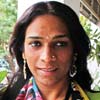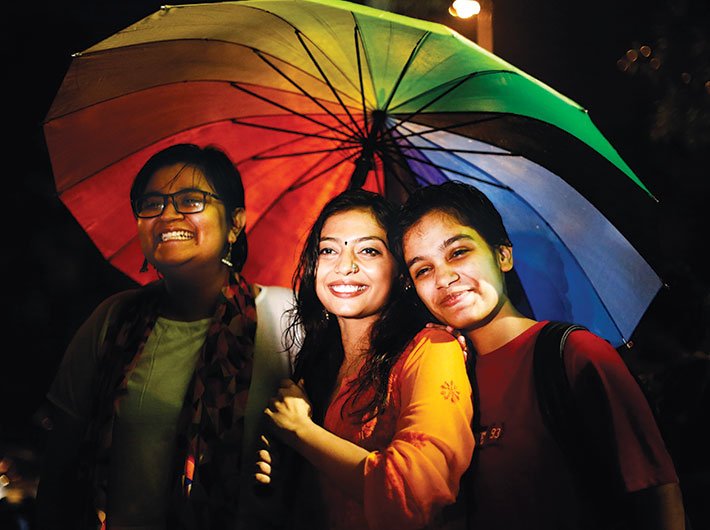For years, transgender community has suffered humiliation and rejection. The hope offered by the Transgender Persons (Protection of Rights) Bill, 2016 faded away soon
What’s common between Shabnam Bano, Joyita Mandal, Prithika Yashini, Manabi Bandopadhyay, Jiya Das, Kalki Subramaniam, and Laxmi Narayan Tripathi? They all are women and all ‘firsts’ in their respective fields. All of them have battled several odds to make a foray into the mainstream. They are all transwomen!
Shabnam mausi is India’s first transgender MLA; Mandal is the first judge; Yashini is the first police officer; Bandopadhyay is the first college principal; Das is the first medical assistant; Subramaniam is the first entrepreneur; and Tripathi, the most well-known figure among all, is a transgender rights activist who has represented Asia Pacific in the UN in 2008.
There are two million transgender people in the country as per 2011 Census. In 2014, the supreme court recognised them as the ‘third gender’ in the famous judgment – National Legal Services Authority v. Union of India, called the NALSA judgment. The SC affirmed that the fundamental rights granted under the Indian constitution will be equally applicable to transgender people, and gave them the right to self-identification of their gender as male, female or third-gender. In 2018, the SC struck down section 377 of the IPC that criminalised homosexuality. In the same year, The Transgender Persons (Protection of Rights) Bill, 2016, which aims to define transgenders and prohibit discrimination against them, was passed by the Lok Sabha. Despite these landmark rulings and legislation, transgenders in India still do not enjoy the same rights as everyone else and are ostracised. They fail to get formal jobs due to social stigma and are forced to beg or do sex work for their survival.
Highlights of 2018 Transgenders Bill
- The definition of ‘transgender persons’ in the bill is at variance with the definitions recognised by international bodies and experts in India.
- A transgender person must obtain a certificate of identity as proof of recognition of identity as a transgender person and to invoke rights under the bill.
- The bill prohibits discrimination against a transgender person in areas such as education, employment, and healthcare.
- It directs the central and state governments to provide welfare schemes for them in above areas.
- Offences like compelling a transgender person to beg, denial of access to a public place, and physical and sexual abuse would attract up to two years’ imprisonment and a fine.
So in 2019 when Apsara Reddy became the first transgender to be appointed as the national general secretary of All India Mahila Congress hopes were high. Even Reddy says, “My inclusion in the mainstream wing like Mahila Congress will definitely pave way for more acceptance and reductions of violence against our community.”
However, Reddy, like the transgender community at a large, is not happy with the amended bill. On the very same day when the bill was passed social media platforms were flooded with messages against the move and the bill was termed as regressive. Grace Banu, a trans-activist from Tamil Nadu and the founder of the Trans Rights Now Collective, even said that it was a “black day”. Anindya Hajra, a transgender woman and activist at Pratyay Gender Trust, had said that the bill reinforces and deepens the apartheid that exists in this country against transpersons.
 “Since ages the hijra community or the transgender persons have been living on badhai or diksha. After people started moving to cities, they [hijras] lost their means of earning. Hence, they either had to beg or do sex work for survival. If you are criminalising begging or sex work then there should be some policies which could help them in getting [alternative livelihood] opportunities.”
“Since ages the hijra community or the transgender persons have been living on badhai or diksha. After people started moving to cities, they [hijras] lost their means of earning. Hence, they either had to beg or do sex work for survival. If you are criminalising begging or sex work then there should be some policies which could help them in getting [alternative livelihood] opportunities.”
Abhina Aher
Associate director, sexuality, gender & right, India HIV/AIDS Alliance
Agrees Reddy: “[The bill] In its current form serves as a piece of paper that reduces transwomen to a level of needing pity and rehabilitation. It is important to see us as a talent pool with skill set who are capable of working, living and growing like any other citizen. This bill also tries to break the familial bonds which the community nurtures.”
Reena Rai, founder, Transqueen India, is of the same opinion. “Rather than being favourable for the community this bill will prove to be a bane. It doesn’t address the real issues of transgender community. There is no representative from the community who could actually relate with the problems which the transgender community faces. Apart from this, until and unless the mindset of the society doesn’t change towards the transgender community no bill can come to the rescue of this community,” she says.
Flaws in the bill
Definition: One of the major flaws in the bill is that it doesn’t give a clear definition of a transgender person. As per the initial definition, a transgender is a person who is “neither wholly female nor wholly male; or a combination of female or male; or neither female nor male; and whose sense of gender does not match with the gender assigned to that person at the time of birth, and includes trans men and trans women, persons with intersex variations and gender-queers.”
“This definition was taken from Australian Law on intersex person and violated the dignity of the transpeople,” says Amritananda Chakravorty, an advocate working on queer rights.
 “[The bill] In its current form serves as a piece of paper that reduces transwomen to a level of needing pity and rehabilitation. It is important to see us as a talent pool with skill set who are capable of working, living and growing like any other citizen.”
“[The bill] In its current form serves as a piece of paper that reduces transwomen to a level of needing pity and rehabilitation. It is important to see us as a talent pool with skill set who are capable of working, living and growing like any other citizen.”
Apsara Reddy
General secretary, All India Mahila Congress
Though the original definition was amended after several protests from the community, yet it is still not a perfect one. The amended definition is “a person whose gender does not match with the gender assigned to that person at birth and includes trans-man or trans-woman (whether or not such person has undergone sex reassignment surgery or hormone therapy or laser therapy or such other therapy), person with intersex variations, gender- queer and person having such socio-cultural identities as kinner, hijra, aravani and jogta.”
The bill gives a straitjacket definition to a transgender. “People who have made the bill don’t even have an idea about what they are making and for whom they are making. They are completely confused between intersex and transgender,” rues Aryan Pasha, a transman bodybuilder.
Reservation: The amended bill doesn’t give any provision of reservation in education or jobs, which was one of the major demands of the community. The bill simply prohibits discrimination against a transgender person in areas such as education, employment, and healthcare. “It is important to give us equal opportunity, reservation in housing schemes, education (at all levels) and most importantly medical subsidy in both psychological counselling and transitioning through laser/surgery so as to bring our community into mainstream,” says Reddy.
The new bill is in direct contrast to the 2014 ruling. As per the NALSA judgment, transpersons were supposed to be classified as part of the OBCs and thereby receive two percent reservation.
“The bill fails to address the civil rights of the transgender community,” says Pasha, adding, “A lot of things were promised to us during meetings before drafting the bill, but no promise has been fulfilled.”
Screening Committee: As per the new bill, a transgender person has to obtain a certificate of identity from a district magistrate by appearing before a screening committee, which would certify their identity as a transgender. The committee would comprise of a medical officer, a psychologist or psychiatrist, a district welfare officer, a government official, and a transgender person. Several activists and transpeople, however, believe setting up a screening committee is against the tenets of the historic NALSA judgment. “The supreme court had categorically said in NALSA judgment that everybody has right to self-determination. Hence, self-identification of transgender persons was completely recognised as part of the constitution or as part of fundamental rights,” says Chakravorty.
Moreover, the community is against the medicalisation of transgender people. They argue that when a man or a woman doesn’t have to face the screening committee to prove their identity then why impose it on a transgender. “If the apex court had said that it is self-declaration of an individual then why are they trying to instigate what is between the legs of a person? If a person wants to declare himself or herself as trans then let him or her do it. If he or she wants some benefit then ask them to face the screening committee. Also the committee should comprise of people from social background rather than medical background, a judge and community people,” says Abhina Aher, associate director, sexuality, gender & right, India HIV/AIDS Alliance.
Grievances: The new bill doesn’t have any mechanism to address the grievances of transpeople. Penalties are imposed when a transgender person is compelled to beg, denied access to public places, and is subjected to physical, sexual and verbal assault. “Clause 12 talks about a complaint officer, but most transpeople are not in formal employment sector. Reason – they don’t complete their education as they are bullied in schools and colleges don’t recognise them. Education is an extremely important issue, but it is put in a very vague manner in the bill. It doesn’t prohibit bullying; it doesn’t ask educational institutions to recognise trans identity,” Chakravorty says.
 “The provision of the [2014] bill which says that anyone above 18 years of age should get the permission from the court to join gharanas should be removed, as this would make life miserable for those kids who are disowned and harassed by their families.”
“The provision of the [2014] bill which says that anyone above 18 years of age should get the permission from the court to join gharanas should be removed, as this would make life miserable for those kids who are disowned and harassed by their families.”
Aryan Pasha
A transman bodybuilder
Also, the bill criminalises begging, which is a primary source of income for many transgenders to sustain themselves. Explaining this, Aher, who is a transgender woman, says, “Since ages the hijra community or the transgender persons have been living on badhai or diksha. After people started moving to cities, they [hijras] lost their means of earning. Hence, they either had to beg or do sex work for survival. If you are criminalising begging or sex work then there should be some policies which could help them in getting [alternative livelihood] opportunities.”
Another major problem with the bill is in the area of punishment awarded for sexual offence to a transgender. “The provision of punishment in the bill violates Article 14 of the constitution and it discriminates with the transgender persons,” says Chakravarty.
Explains Aher: “If a woman is raped the punishment is from seven years to life imprisonment. But in case the same crime is committed against the transgender it [punishment] ranges from six months to two years only. Why?”
Moreover, the punishment is the same in all the cases, be it sexual abuse or enticement to beg. The government sees no difference in a sexual crime or begging! The government has failed to understand the actual needs of the community and has come out with the bill hastily.
“The issue with the bill and the approach of the government is that first of all the government is not including us. Secondly, you are ignoring us when we are trying to work with you. Thirdly, you are creating something for us in a hustle, which is not working for us. So this will make the situation even worse,” says Aher.
What does the community want?
The community and the activists demand to scrap the 2016 government bill and implement 2014 NALSA judgment. The community feels that they were not consulted before tabling the bill. Moreover, they feel the government fails to understand their gender identity as there is no transgender in the parliament.
“Rather than bringing another bad bill, the government should go ahead with either the 2014 NALSA judgment or the bill presented by DMK MP Tiruchi Siva [passed by the Rajya Sabha in 2015] as it had better provisions. Mainstreaming of transpeople is necessary and for this the government should refer to the NALSA judgment, which talks about a massive campaign on transgender stigma reduction from the government,” says Aher.
“
It [NALSA] was a very historic judgment and even referred by Pakistan, Nepal and Bangladesh. The community thought that it was not inclusive enough, but since the judgment was progressive they accepted it,” Aher adds.
Apart from that the community also feels that they should get reservations in education, jobs, health facilities, etc. “There should be a provision of stipend for transwomen who have taken up public or private internships or vocational training. This is a better way to incentivise the efforts to mainstream too,” suggests Reddy.
Rai on the other hand feels that before giving reservation, efforts should be made to create more opportunities for transgenders so that they don’t resort to begging or prostitution.
For this, Aher suggests giving skill development training to transpeople. She says that if the government can’t make provisions for transpeople to get a job in the private sector, then it should give them opportunities in the government sector. A transgender in the Chhattisgarh police department can be a case wirth emulating.
Some activists also suggest that prison term in case of a crime against transperson should increase from the current term of six months to two years. “Don’t they [transgenders] feel offended in the same way like other people when they face sexual exploitation?” asks Rai.
Pasha makes another important suggestion for the upliftment of transgender community. He says that nobody should be stopped from joining the hijra gharanas. “The provision of the [2014] bill which says that anyone above 18 years of age should get the permission from the court to join gharanas should be removed, as this would make life miserable for those kids who are disowned and harassed by their families.”
Aher even goes a step ahead and proposes that if the government is unable to understand the actual needs of the community, then it should rather leave it to the community to mainstream themselves. A lot of initiatives have been taken by the community for itself.
Agrees Rai: “Rather than saying acceptance, it is more about people coming forward and proudly revealing their identity. It would still take time for the society to accept them. Things have started improving – recently a transgender was appointed as the general secretary of Mahila Congress, Kinnar Akhada was given recognition and permission to participate in the Kumbh, some of my transwomen were given opportunities in The Lalit group of hotels.”
rahultrivedi@governancenow.com
(This article appears in the May 15, 2019 edition)

